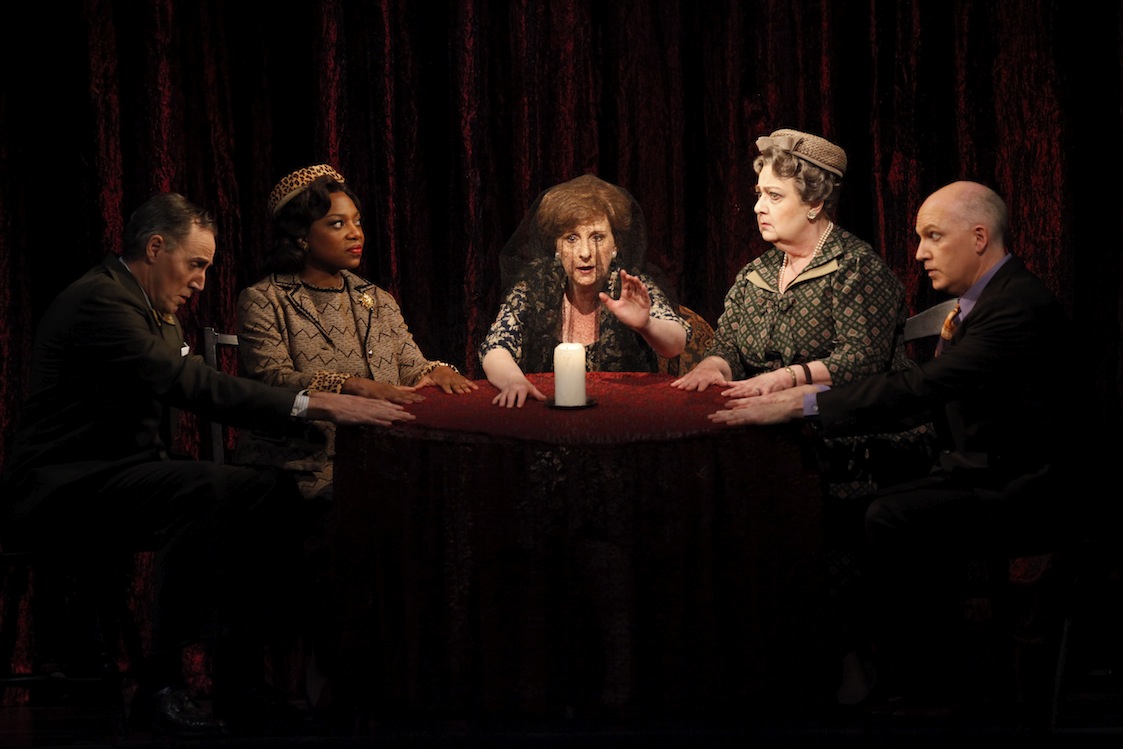Schwartz’s “Seance” proves an unconvincing mix of melody and kitsch

Lauren Flanigan (center) stars in Stephen Schwartz's "Seance on a Wet Afternoon" at New York City Opera. Photo: Carol Rosegg
Did you like The Lovely Bones? Never mind the mawkish movie. Were you moved to tears, as 2 million readers were, by Alice Sebold’s novel about a 13-year-old murder victim pulling strings in heaven to help her grieving parents achieve closure?
If the answer is yes, you’ll likely enjoy Stephen Schwartz’ Séance on a Wet Afternoon, which had its East Coast premiere this week at New York City Opera – as far as one can enjoy an opera about the abduction and eventual murder of a young girl at the hands of a middle-aged clairvoyant and the ghost of her stillborn son.
If you were among the cynical minority who thought that Sebold was merely tapping into a 9-11-fueled craze for transcendental kitsch, you will have similar misgivings about this opera, which takes a taut psychological thriller and tacks onto it a denouement shimmering with Christian overtones of consolation, penitence, and – yes, into a shaft of light — ascension.
Schwartz based his opera on the 1964 British film with Kim Stanley and Richard Attenborough, itself an adaptation of a novel by Mark McShane. The central character is Myra Foster (Lauren Flanigan), a small-time medium who holds poky séances in her Victorian house in San Francisco, in which she channels the ghost of her dead son, Arthur. She talks her hen-pecked husband, Bill (sung by Kim Josephson), into abducting the daughter of a businessman in order to gain public recognition with help in solving the case. But then Myra begins to see young Adriana (Bailey Grey), as a surrogate daughter, and the logical next step is to join her with her dead “lovey” in the after-life by murdering her. At the final séance in the presence of the dead girl’s parents, Adriana’s ghost appears, not only to indict her murderers, but also to console her grieving mother. “I like it here,” she says of her shallow grave under a moss-covered rock. “Yes, mommy, I am happy.”
The music for all this is as “lovely” as Sebold’s Bones. Schwartz made his name on Broadway and in film, with hits such as Wicked, Godspell and the score to Pocahontas, and he knows how to write a good tune. This is his first opera (it premiered at Opera Santa Barbara in 2009), in a production effectively directed by his son, Scott with milky translucent sets by Heidi Ettinger.
At times you can sense the eagerness with which Schwartz dips his hands deep into opera’s bag of tricks. In the scene in which Myra discusses her abduction plan with Bill, he gives her soaring vocal lines and swelling strings to express her sense of hopefulness, but adds her favorite “recording” of a maudlin Irish folk song indicating her psychotic sense of disassociation. Meanwhile, some dissonant notes in the double basses hint at the horror to come. The séances see him experimenting with an overlaying of voices as Myra channels the ghosts, pitting Flanigan’s vibrant, rich soprano against the haunting pure children’s voices. Boy soprano Michael Kepler Meo sang the dead Arthur with a voice of uncanny maturity, sophistication and beauty; Grey was a touching Adriana.
Other moments are more boilerplate. The chorus of cynical newspaper reporters baying for blood is set to choppy rhythms that evoke Leonard Bernstein but somehow fall short. Scenes of the supernatural were announced by the tinkling of celeste and harp, a stock cinematic cue for magic since at least Edward Scissorhands.
Vocally, the female singers eclipsed the men on stage just as they did in the story. Flanigan gave a passionate portrayal of a woman driven mad by the loss of a child; Melody Moore sang the part of Adriana’s mother with a gleaming, polished soprano. Josephson was strangely lifeless as Bill, the husband who executes his wife’s criminal plans with zombie-like languor. His fine, nuanced baritone only really came into its own in You didn’t know her then, a tuneful aria about his love for Myra that, heard out of context, might be mistaken for a Cole Porter standard. In the opera, however, it serves as a prelude for Bill pressing a cloth drenched in chloroform onto Adriana’s mouth and nose and will be the last words she hears in this life.
“We both wanted what we wanted, we both loved what we loved too much,” Bill sings a little later, after Myra has suffocated her captive with a pillow. It was an excess of love, we are told, that undid this couple. An excess of lovely music undid what should have been a bone-chilling tale.
Séance on a Wet Afternoon is playing at New York City Opera on April 24, 26, 28, 29, 30 and on May 1. nycopera.com; 212-721.6500.
Posted Apr 24, 2011 at 8:39 am by Rob Wright
Perhaps a spoiler alert would be appropriate with this review since you give away the ending, TWICE!
Posted Apr 25, 2011 at 3:25 pm by Fraser
I’m not sure that I ever go to an opera expecting to be surprised by the ending, actually. Perhaps that’s just me, though.